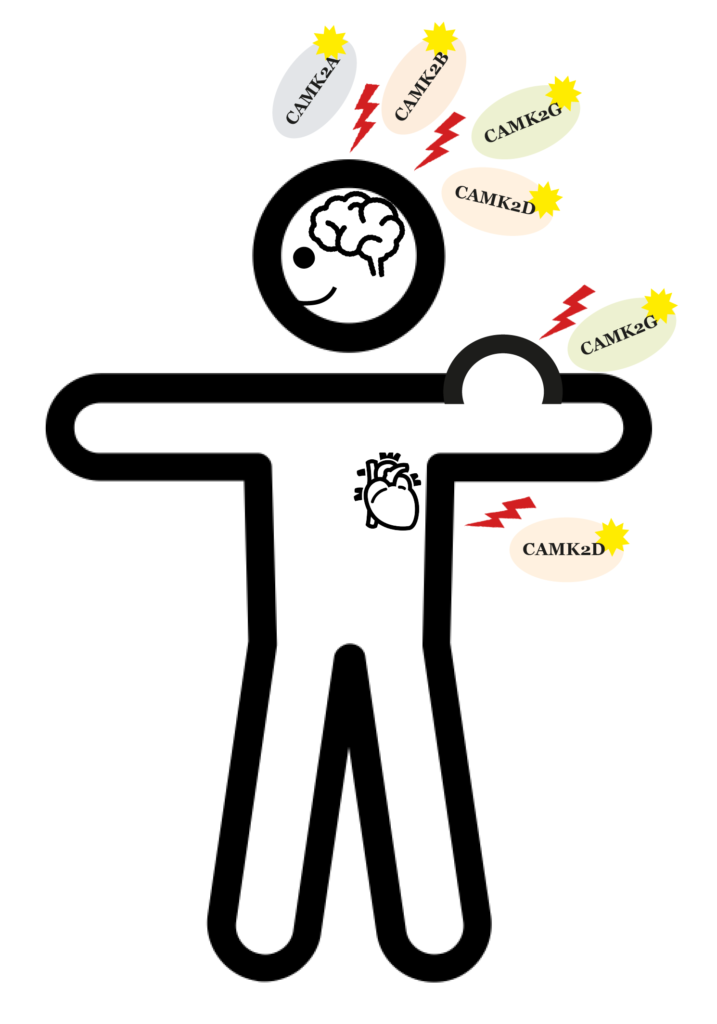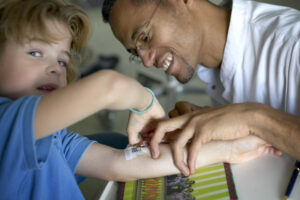What is CAMK2 Syndrome?
 CAMK2 is the abbreviation of the complicated English term 'Calcium-calmodulin dependent protein kinase 2', translated into Dutch as Calcium-calmodulin dependent protein kinase type 2. It is the name for a group of 4 proteins (also called enzymes), which are very similar (alpha (CAMK2A), beta (CAMK2B), gamma (CAMK2G) and delta (CAMK2D)). CAMK2A and CAMK2B are the most abundant proteins in our brain. A lot of scientific research has already been done in our laboratory into the role of CAMK2A and CAMK2B in the brain, so we know that they are very important proteins for learning, memory and motor skills. It is therefore easy to understand that the first children and adults who were described with this condition (CAMK2A + CAMK2B) have mild to severe intellectual disability and often also show motor coordination problems. In the medical world we also call this a neurodevelopmental disorder. A malfunctioning CAMK2G protein not only causes intellectual disabilities, but also problems with the muscles. In addition to the brain, CAMK2D is also very important for the heart. There is currently no drug for the treatment of CAMK2 Syndrome.
CAMK2 is the abbreviation of the complicated English term 'Calcium-calmodulin dependent protein kinase 2', translated into Dutch as Calcium-calmodulin dependent protein kinase type 2. It is the name for a group of 4 proteins (also called enzymes), which are very similar (alpha (CAMK2A), beta (CAMK2B), gamma (CAMK2G) and delta (CAMK2D)). CAMK2A and CAMK2B are the most abundant proteins in our brain. A lot of scientific research has already been done in our laboratory into the role of CAMK2A and CAMK2B in the brain, so we know that they are very important proteins for learning, memory and motor skills. It is therefore easy to understand that the first children and adults who were described with this condition (CAMK2A + CAMK2B) have mild to severe intellectual disability and often also show motor coordination problems. In the medical world we also call this a neurodevelopmental disorder. A malfunctioning CAMK2G protein not only causes intellectual disabilities, but also problems with the muscles. In addition to the brain, CAMK2D is also very important for the heart. There is currently no drug for the treatment of CAMK2 Syndrome.
What Causes CAMK2 Syndrome?
The condition develops when the CAMK2 protein that the body makes is absent or does not work properly. The “recipe” for the production of the CAMK2 protein is stored in our genetic material, the DNA. The DNA contains the genetic code for our hereditary characteristics, the genes. The DNA is packed in chromosomes.
The CAMK2A protein is made by reading the CAMK2A gene, the protein CAMK2B by reading the CAMK2B gene, etc. If errors (‘mutations)’ occur in these genes, this can lead to a non-functional CAMK2 protein being made, causing the protein to perform abnormally.
How common is CAMK2 Syndrome?
In collaboration with other centers around the world, we have only discovered CAMK2 related disorders very recently (2017). Currently (in 2020) around 70 patients have been diagnosed worldwide, of which less than 10 patients live in the Netherlands. So it is a very rare condition. At the same time, we expect this number to increase in the coming years, as many patients are unlikely to have received a genetic diagnosis yet.
Examination and diagnosis
 The diagnosis of CAMK2 can be established by genetic testing.
The diagnosis of CAMK2 can be established by genetic testing.
In the Netherlands, children with intellectual disability or severe developmental delay are referred to a Pediatrician for Genetic & Congenital Disorders or to a Clinical geneticist to identify the cause. In the past 10 years, genetic tests, so-called "Whole Exome" and Whole Genome "sequencing (WES and WGS for short) have been developed that make this possible. To do this test, the doctor involved will ask for permission to take some blood from your child and you as biological parents. The results often require several months.
Finally, it is important to mention that CAMK2 cannot be recognized on the basis of external characteristics.
The CAMK2 consultation hour
At the CAMK2 consultation hour of the ENCORE Expertise Center we see children with a proven or probably harmful DNA change ("mutation") in one of the four CAMK2 genes.
If your child has a DNA change in the CAMK2 gene that has not been previously described (a so-called ‘Variant of Unknown Significance ‘or "VUS"), we will perform specific CAMK2 tests in the lab to test the pathogenicity.
During your appointment you will be seen by a team of medical specialists and paramedics who have extensive experience with patients with (rare) genetic neurodevelopmental disorders. This experience has been gained over the past decades in conditions that can be very similar to CAMK2.
Because CAMK2 disorder is so new, we will not always have an answer to all your questions and a visit to our expertise center will mainly focus on collecting all information from CAMK2 patients in one place in the world. Hence, we also see patients from abroad. In this way, we will hopefully gain more and more knowledge of CAMK2 together in the coming years, so that we can help you and the local doctors who guide you and your child as well as possible.
It is therefore important to mention that we are not taking over your child's regular medical care from his / her already involved pediatrician or pediatric neurologist.
During your first visit to the outpatient clinic, we will have an extensive intake interview to identify all medical problems as well as possible.
Prior to this visit, we will send you an extensive questionnaire to gather as much information as possible so that we can discuss the most important concerns for you during the visit. We also ask for your written consent to collect all medical information about your child for research purposes.
Based on your story and the medical problems described so far, we will initiate additional investigations or give advice to the doctor of your child.
Epilepsy
Making an EEG (or brain video) is useful in (suspected) epilepsy.
If epilepsy is indeed present, the pediatric neurologist can prescribe medication to reduce the number or severity of the seizures. In very severe forms of epilepsy, a special diet (called a ketogenic diet) can sometimes also help, but this will have to be considered per child.
Mobility
Our pediatric physiotherapist will examine your child and, if necessary, give advice to stimulate and guide your child's motor development. It may also be useful to involve a pediatric rehabilitation doctor in your area of residence in the care. This is especially true if your child has a medical need tools for her / his daily care. If your child is not yet known to a pediatric physiotherapist or rehabilitation doctor, we can give advice.
Communication
Because many CAMK2 children are behind in their language comprehension and speech, it is very important to offer additional communication options from an early age. Part of the problem behavior may have an origin in insufficient opportunities to express. Also, a speech therapist can advise in swallowing difficulties.
Intestinal complaints
Some of the children with CAMK2 DNA variants have poorly mobile or over-mobile intestines, which can lead to vomiting and poor growth or constipation (blockage). Depending on the problems, we can advise on the possible cause and treatment such as types of food, certain medications or nutrition via a tube.
Intellectual development
If your child is about to go to school and his / her development level has not yet been determined, we recommend doing this, in order to choose the best choice of school and to prevent your child from being under- or over-questioned.
Behavioral problems
For behavioral problems, a child and adolescent psychiatrist, neuropsychologist and / or behavioral therapist can help diagnose and treat
Pediatrician Genetic & Congenital Disorders and coordinator: Dr. Danielle Veenma
Pediatric neurologist: Dr. Marie-Claire de Wit
Child & Adolescent Psychiatrist: Dr. Leontine ten Hoopen
Child behavioral therapist: Dr. Maartje ten Hooven-Radstaake
Pediatric physical therapist: Laurentine Kamminga-van Wessem
Pediatric speech therapist: Cindy Navis
GDPR: Dr. Anja Kattentidt, Dr. Agnies van Eeghen
Internist-endocrinologist with focus EAA: Dr. Laura de Graaff
Research leader preclinical research: Dr. Geeske van Woerden
Click here to go to the contact form or mail yourself to: CAMK2disorders@erasmusmc.nl
In order to provide the best possible care to patients with a rare condition, it is essential that global knowledge about the condition is gathered. Nationwide, centers of expertise have been set up to stimulate care for rare disorders and to gather knowledge. For the formal recognition of an expertise center by the Ministry of Health, an important condition is that the expertise center gathers, analyzes and shares knowledge through publications. These can be publications in scientific journals, but also treatment guidelines for health care professionals or information brochures for patients or caregivers. We optimize care and research within ENCORE through standardized follow-up and close collaboration between doctors and researchers. That way, we can ultimately develop better treatments for rare conditions. You may therefore be asked to participate in research. Participation in research is always on a voluntary basis. The data obtained is stored and analyzed in an anonymous form. All research has been approved in advance by an ethics review committee.
To learn more about research into CAMK2 Syndrome at ENCORE, click here
Patient organization
There is a facebook page for parents of children with CAMK2 related disorders (CAMK2 Gene Related Disorders).
At the end of 2020, the CAMK2 therapeutics foundation was established with which we collaborate closely with ENCORE. Click here for more information about the goals and activities of the parent organization.
Extras
If you would like to know more about the CAMK2 research we do in the lab, click here
Would you like to know more about genetic research? Click here to go to a website about heritability (only in Dutch), or go to the site of the Erasmus MC, department of clinical genetics.
